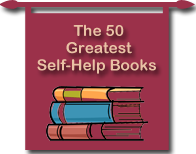Self Help
About The Guide to Self Help Books
A Bewildering Array of Choices in Self Help Books
Thousands of self help books are published each year; a search on Amazon.com for "self help books" yielded 162,530 titles! More limited searches still return huge numbers of related books. Amazon has 88,460 titles listed under "depression"; 79,292 titles under "intimate relationships"; and 53,623 titles listed under "meditation".
This is the blessing and the curse of the Internet: an amazing amount of information is instantly available at your fingertips, but the challenge is figuring out how to make sense of it. How do you select the one or two self help titles likely to be the most useful for your purposes?
I'm a Clinical Psychologist, in private practice for over 30 years. My clients have often asked, "Isn't there something I can read on this?" -- referring to the issue with which they were struggling. Many times, I had a reference to give them, but too often I did not. So The Guide To Self Help Books has grown out of my desire to provide useful information to my clients -- and to others who wish to read and study on their own.
Separating the Good from the Bad in Self Help Books
There are thousands of Self Help books on bookstore shelves. Each has a shiny, appealing cover, an author with professional degrees, and blurbs on the back cover recommending the book as the latest word on the subject. Unfortunately, too much of this is hype-driven by marketing imperatives to sell books.
I urge you not to spend your time reading self help books that promise unrealistic results! This is difficult; when we are searching for help we want to believe that the outcome we seek is possible. Thus there is a built-in desire to believe authors' claims about their books.
Over the years I have talked with many people in my office who have become discouraged and frustrated after failing to achieve the results a self help book claimed were possible. Even though the promised outcome may have been unrealistic, it is very easy for the concerned reader to blame himself -- for not trying hard enough, or for not doing it correctly. This is a too-frequent negative outcome, and I believe it is related to the poor quality of the self help book consulted.
Some self help books take an overly-simplistic approach and do not help you deal with the real-life complexities of the issue. True and lasting change is most likely to be incremental, the result of many small steps taken, skills learned, new insights gained. Books which hold out the promise of overnight transformation are more likely to leave the reader feeling like a failure, unable to live up to the promises trumpeted on the book's cover.
Self help books are tools for you to use -- information, guidance, encouragement, and stories of other persons who have grappled with similar issues. When you read a self help book, please do so with a critical eye. If it makes sense, if it speaks to you -- read on; if it doesn't fit your life or your circumstances, then it is neither useful nor worthy of your time.
How Were the Books Chosen for the Guide To Self Help Books?
Many of the books on this list have proven useful to my clients, who report back when something works for them. Other books were recommended by my colleagues, listed below, who have also sent their clients to the bookstore or library to read useful material. Many of these books have been helpful to me, in a personal way. A number of them are classics, still in print after many years -- an index of their usefulness. Another source of valuable books has been the reviews and reader ratings found on Amazon.com pages.
A special resource for those seeking further information on Self-Help topics is the book below. I recommend it highly as a dependable and thorough reference work. It has been recently updated.
 Authoritative Guide to Self-Help Resources in Mental Health
Authoritative Guide to Self-Help Resources in Mental Health
This book is based on eight national studies conducted over ten years in which lengthy surveys were mailed to some 3500 Clinical and Counseling Psychologists, who rated the self-help books listed in the surveys. Revised in 2003, the book includes extensive descriptions of the books referenced, a five-star rating system, and sections on relevant films and Internet sites.2003, Guilford Press, Revised edition
Acknowledgements
Many thanks to the participants in my informal data-gathering project on these resources -- my colleagues and friends -- Sandi Anders, M.Div.. CSC; Jerome Burt, Ph.D.; Phil Chanin, Ed.D., ABPP, CGP; Reid Findlayson, M.D.; Kendra Gray, Ph.D.; Ari Holtz, Ph.D.; Chad Johnson, Ph.D.; Lloyd Lewis, S.T.D., M.A.; Ginger Manley, M.S.N, APRN, BC; Lynn Odom, PT, MOMT; Dodge Rea, Ph.D.; Beth Sheller, M.S.N.; Karen Sothers, M.Ed.; Julia Tate, J.D., LCSW; Warren Thompson, Ph.D.; and Tim Tribiano, Ph.D.
I've appreciated the diversity of their input. Of course, I've made the final choices listed in the Guide and bear responsibility for any errors.

